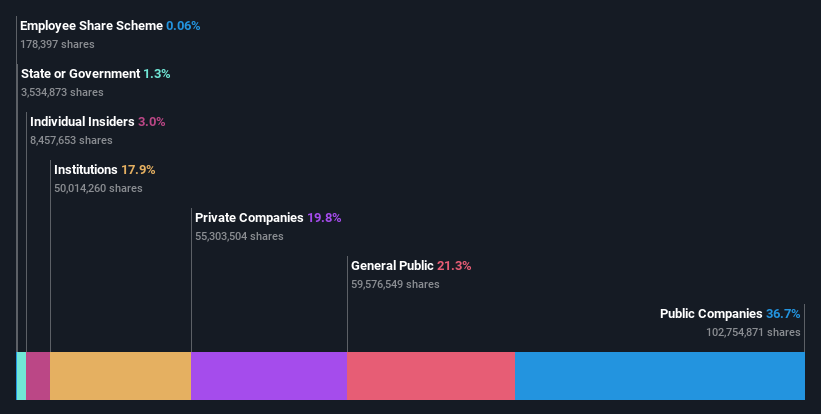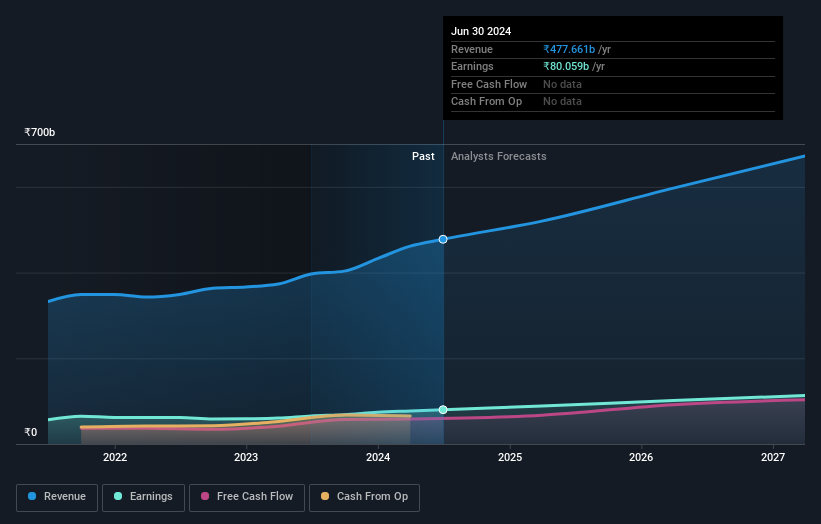Bajaj Auto Limited (NSE:BAJAJ-AUTO) stock most popular amongst public companies who own 37%, while individual investors hold 21%
Key Insights
- Significant control over Bajaj Auto by public companies implies that the general public has more power to influence management and governance-related decisions
- A total of 3 investors have a majority stake in the company with 52% ownership
- Institutions own 18% of Bajaj Auto
Every investor in Bajaj Auto Limited (NSE:BAJAJ-AUTO) should be aware of the most powerful shareholder groups. We can see that public companies own the lion's share in the company with 37% ownership. In other words, the group stands to gain the most (or lose the most) from their investment into the company.
And individual investors on the other hand have a 21% ownership in the company.
In the chart below, we zoom in on the different ownership groups of Bajaj Auto.
See our latest analysis for Bajaj Auto

What Does The Institutional Ownership Tell Us About Bajaj Auto?
Many institutions measure their performance against an index that approximates the local market. So they usually pay more attention to companies that are included in major indices.
Bajaj Auto already has institutions on the share registry. Indeed, they own a respectable stake in the company. This can indicate that the company has a certain degree of credibility in the investment community. However, it is best to be wary of relying on the supposed validation that comes with institutional investors. They too, get it wrong sometimes. When multiple institutions own a stock, there's always a risk that they are in a 'crowded trade'. When such a trade goes wrong, multiple parties may compete to sell stock fast. This risk is higher in a company without a history of growth. You can see Bajaj Auto's historic earnings and revenue below, but keep in mind there's always more to the story.

Hedge funds don't have many shares in Bajaj Auto. Bajaj Holdings & Investment Limited is currently the company's largest shareholder with 37% of shares outstanding. Bajaj Sevashram Pvt. Ltd. is the second largest shareholder owning 12% of common stock, and Firodia Group of companies holds about 3.5% of the company stock. Furthermore, CEO Rajivnayan Bajaj is the owner of 0.5% of the company's shares.
A more detailed study of the shareholder registry showed us that 3 of the top shareholders have a considerable amount of ownership in the company, via their 52% stake.
While it makes sense to study institutional ownership data for a company, it also makes sense to study analyst sentiments to know which way the wind is blowing. Quite a few analysts cover the stock, so you could look into forecast growth quite easily.
Insider Ownership Of Bajaj Auto
The definition of an insider can differ slightly between different countries, but members of the board of directors always count. Management ultimately answers to the board. However, it is not uncommon for managers to be executive board members, especially if they are a founder or the CEO.
Insider ownership is positive when it signals leadership are thinking like the true owners of the company. However, high insider ownership can also give immense power to a small group within the company. This can be negative in some circumstances.
Shareholders would probably be interested to learn that insiders own shares in Bajaj Auto Limited. The insiders have a meaningful stake worth ₹82b. we sometimes take an interest in whether they have been buying or selling.
General Public Ownership
The general public-- including retail investors -- own 21% stake in the company, and hence can't easily be ignored. While this size of ownership may not be enough to sway a policy decision in their favour, they can still make a collective impact on company policies.
Private Company Ownership
It seems that Private Companies own 20%, of the Bajaj Auto stock. It's hard to draw any conclusions from this fact alone, so its worth looking into who owns those private companies. Sometimes insiders or other related parties have an interest in shares in a public company through a separate private company.
Public Company Ownership
We can see that public companies hold 37% of the Bajaj Auto shares on issue. It's hard to say for sure but this suggests they have entwined business interests. This might be a strategic stake, so it's worth watching this space for changes in ownership.
Next Steps:
It's always worth thinking about the different groups who own shares in a company. But to understand Bajaj Auto better, we need to consider many other factors. Case in point: We've spotted 1 warning sign for Bajaj Auto you should be aware of.
If you would prefer discover what analysts are predicting in terms of future growth, do not miss this free report on analyst forecasts.
NB: Figures in this article are calculated using data from the last twelve months, which refer to the 12-month period ending on the last date of the month the financial statement is dated. This may not be consistent with full year annual report figures.
Valuation is complex, but we're here to simplify it.
Discover if Bajaj Auto might be undervalued or overvalued with our detailed analysis, featuring fair value estimates, potential risks, dividends, insider trades, and its financial condition.
Access Free AnalysisHave feedback on this article? Concerned about the content? Get in touch with us directly. Alternatively, email editorial-team (at) simplywallst.com.
This article by Simply Wall St is general in nature. We provide commentary based on historical data and analyst forecasts only using an unbiased methodology and our articles are not intended to be financial advice. It does not constitute a recommendation to buy or sell any stock, and does not take account of your objectives, or your financial situation. We aim to bring you long-term focused analysis driven by fundamental data. Note that our analysis may not factor in the latest price-sensitive company announcements or qualitative material. Simply Wall St has no position in any stocks mentioned.
About NSEI:BAJAJ-AUTO
Bajaj Auto
Engages in the development, manufacture, and distribution of automobiles in India and internationally.
Adequate balance sheet average dividend payer.
Similar Companies
Market Insights
Community Narratives



